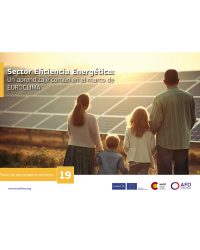Climate Vulnerability and Risks in the Agriculture Sector of Latin America
888 Downloads
 The technical document “Climate Vulnerability and Risks in the Agriculture Sector of Latin America” is part of the series of publications based on the webinars and round table discussions organized by the EUROCLIMA+ programme in the Resilient Food Production (RFP) sector .
The technical document “Climate Vulnerability and Risks in the Agriculture Sector of Latin America” is part of the series of publications based on the webinars and round table discussions organized by the EUROCLIMA+ programme in the Resilient Food Production (RFP) sector .
The publication defines the theoretical concepts of climate vulnerability and risk and provides case studies and lessons learned in climate measurement and in establishing vulnerability baselines of different family farming systems, which were shared by key actors in projects co-financed by EUROCLIMA+ in Argentina, Colombia, Honduras and Ecuador and by various regional institutions.
| Category: | Serie Documentos técnicos |
| File Size: | 2.06 MB |
| Hits: | 8104 Hits |
| Download: | 888 times |
| Título: | Climate Vulnerability and Risks in the Agriculture Sector of Latin America |
| Autor: | Andrea Schloenvoigt |
| Año: | 2022 |
| Catálogo: | MN-BK-21-005-EN-N |
| Formato: |






